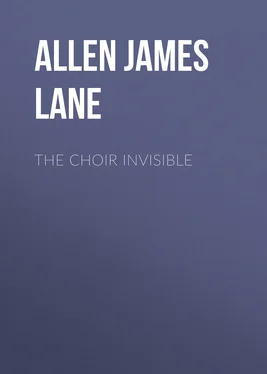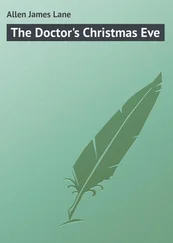James Allen - The Choir Invisible
Здесь есть возможность читать онлайн «James Allen - The Choir Invisible» — ознакомительный отрывок электронной книги совершенно бесплатно, а после прочтения отрывка купить полную версию. В некоторых случаях можно слушать аудио, скачать через торрент в формате fb2 и присутствует краткое содержание. Жанр: foreign_prose, foreign_antique, на английском языке. Описание произведения, (предисловие) а так же отзывы посетителей доступны на портале библиотеки ЛибКат.
- Название:The Choir Invisible
- Автор:
- Жанр:
- Год:неизвестен
- ISBN:нет данных
- Рейтинг книги:3 / 5. Голосов: 1
-
Избранное:Добавить в избранное
- Отзывы:
-
Ваша оценка:
- 60
- 1
- 2
- 3
- 4
- 5
The Choir Invisible: краткое содержание, описание и аннотация
Предлагаем к чтению аннотацию, описание, краткое содержание или предисловие (зависит от того, что написал сам автор книги «The Choir Invisible»). Если вы не нашли необходимую информацию о книге — напишите в комментариях, мы постараемся отыскать её.
The Choir Invisible — читать онлайн ознакомительный отрывок
Ниже представлен текст книги, разбитый по страницам. Система сохранения места последней прочитанной страницы, позволяет с удобством читать онлайн бесплатно книгу «The Choir Invisible», без необходимости каждый раз заново искать на чём Вы остановились. Поставьте закладку, и сможете в любой момент перейти на страницу, на которой закончили чтение.
Интервал:
Закладка:
His figure passed out of sight, and she turned and walked sorrowfully to the cabin, from the low rugged chimney of which a pale blue smoke now rose into the twilight air. She chid herself that she had confronted the declaration of his purpose to marry her niece with so little spirit, such faulty tact. She had long known that he would ask this; she had long gotten ready what she would say; but in the struggle between their wills, she had been unaccountably embarrassed, she had blundered, and he had left rather strengthened than weakened in his determination.
But she must prevent the marriage; her mind was more resolute than ever as to that. Slowly she reached the doorstep of the cabin, a roughly hewn log, and turning, stood there with her bonnet in her hand, her white figure outlined before the doorway, slender and still. The sun had set. Night was rushing on over the awful land. The wolf-dog, in his kennel behind the house, rose, shook himself at his chain, and uttered a long howl that reached away to the dark woods—the darker for the vast pulsing yellow light that waved behind them in the west like a gorgeous soft aerial fan. As the echoes died out from the peach orchard came the song of a robin, calling for love and rest. Then from another direction across the clearing another sound reached her: the careless whistle of the major, returning from his day's work in the field. When she heard that, her face took on the expression that a woman sometimes comes to wear when she has accepted what life has brought her although it has brought her nothing for which she cares; and her lips opened with an unconscious sigh of weariness—the weariness that has been gathering weariness for years and that runs on in weariness through the future.
Later, she was kneeling before the red logs of the fireplace with one hand shielding her delicate face from the blistering heat; in the other holding the shingle on which richly made and carefully shaped was the bread of Indian maize that he liked. She did not rise until she had placed it where it would be perfectly browned; otherwise he would have been disappointed and the evening would have been spoiled.
IV
JOHN GRAY did not return to town by his straight course through the forest, but followed the winding wagon-road at a slow, meditative gait. He was always thoughtful after he had been with Mrs. Falconer; he was unusually thoughtful now; and the gathering hush of night, the holy expectancy of stars, a flock of white clouds lying at rest low on the green sky like sheep in some far uplifted meadow, the freshness of the woods soon to be hung with dew,—all these melted into his mood as notes from many instruments blend in the ear. But he was soon aroused in an unexpected way. When he reached the place where the wagon-road passed out into the broader public road leading from Lexington to Frankfort, he came near stumbling over a large, loose bundle, tied in a blue and white neckerchief. Plainly it had been lost and plainly it was his duty to discover if possible to whom it belonged. He carried it to one side of the road and began to examine its contents: a wide, white lace tucker, two fine cambric handkerchiefs, two pairs of India cotton hose, two pairs of silk hose, two thin muslin handkerchiefs, a pair of long kid gloves,—straw colour,—a pair of white kid shoes, a pale-blue silk coat, a thin, white striped muslin dress.The articles were not marked. Whose could they be? Not Amy's: Mrs. Falconer had expressly said that the major was to bring her finery to town in the gig the next day. They might have been dropped by some girl or by some family servant, riding into town; he knew several young ladies, to any one of whom they might belong. He would inquire in the morning; and meantime, he would leave the bundle at the office of the printer, where lost articles were commonly kept until they could be advertised in the paper, and called for by their owners. He replaced the things, and carefully retied the ends of the kerchief. It was dark when he reached town, and he went straight to his room and locked the bundle in his closet. Then he hurried to his tavern, where his supper had to be especially cooked for him, it being past the early hour of the pioneer evening meal. While he sat out under the tree at the door, waiting and impatiently thinking that he would go to see Amy as soon as he could despatch it, the tavern-keeper came out to say that some members of the Democratic Society had been looking for him. Later on, these returned. A meeting of the Society had been called for that night, to consider news brought by the postrider the day previous and to prepare advices for the Philadelphia Society against the postrider's return: as secretary, he was wanted at the proceedings. He begged hard to be excused, but he was the scholar, the scribe; no one would take his place. When the meeting ended, the hour was past for seeing Amy. He went to his room and read law with flickering concentration of mind till near midnight. Then he snuffed out his candle, undressed, and stretched himself along the edge of his bed.
It was hard and coarse. The room itself was the single one that formed the ruder sort of pioneer cabin. The floor was the earth itself, covered here and there with the skins of wild animals; the walls but logs, poorly plastered. From a row of pegs driven into one of these hung his clothes—not many. The antlers of a stag over the doorway held his rifle, his hunting-belt, and his hat. A swinging shelf displayed a few books, being eagerly added to as he could bitterly afford it—with a copy of Paley, lent by the Reverend James Moore, the dreamy, saintlike, flute-playing Episcopal parson of the town. In the middle of the room a round table of his own vigorous carpentry stood on a panther skin; and on this lay some copy books in which he had just set new copies for his children; a handful of goosequills to be fashioned into pens for them; the proceedings of the Democratic Society, freshly added to this evening; copies of the Kentucky Gazette containing essays by the political leaders of the day on the separation of Kentucky from the Union and the opening of the Mississippi to its growing commerce—among them some of his own, stately and academic, signed "Cato the Younger." Lying open on the table lay his Bible; after law, he always read a little in that; and to-night he had reread one of his favourite chapters of St.Paul: that wherein the great, calm, victorious soldier of the spirit surveys the history of his trials, imprisonments, beatings. In one corner was set a three-cornered cupboard containing his underwear, his new cossack boots, and a few precious things that had been his mother's: her teacup and saucer, her prayer-book. It was in this closet that he had put the lost bundle.
He had hardly stretched himself along the edge of his bed before he began to think of this. Every complete man embraces some of the qualities of a woman, for Nature does not mean that sex shall be more than a partial separation of one common humanity; otherwise we should be too much divided to be companionable. And it is these womanly qualities that not only endow a man with his insight into the other sex, but that enable him to bestow a certain feminine supervision upon his own affairs when no actual female has them in charge. If he marries, this inner helpmeet behaves in unlike ways toward the newly reigning usurper; sometimes giving up peaceably, at others remaining her life-long critic—reluctant but irremovable. If many a wife did but realize that she is perpetually observed not only by the eyes of a pardoning husband but by the eyes of another woman hidden away in the depths of his being, she would do many things differently and not do some things at all.
The invisible slip of a woman in Gray now began to question him regarding the bundle. Would not those delicate, beautiful things be ruined, thus put away in his closet? He got up, took the bundle out, laid it on his table, untied the kerchief, lifted carefully off the white muslin dress and the blue silk coat, and started with them toward two empty pegs on the wall. He never closed the door of his cabin if the night was fine. It stood open now and a light wind blew the soft fabrics against his body and limbs, so that they seemed to fold themselves about him, to cling to him. He disengaged them reluctantly—apologetically.
Читать дальшеИнтервал:
Закладка:
Похожие книги на «The Choir Invisible»
Представляем Вашему вниманию похожие книги на «The Choir Invisible» списком для выбора. Мы отобрали схожую по названию и смыслу литературу в надежде предоставить читателям больше вариантов отыскать новые, интересные, ещё непрочитанные произведения.
Обсуждение, отзывы о книге «The Choir Invisible» и просто собственные мнения читателей. Оставьте ваши комментарии, напишите, что Вы думаете о произведении, его смысле или главных героях. Укажите что конкретно понравилось, а что нет, и почему Вы так считаете.












